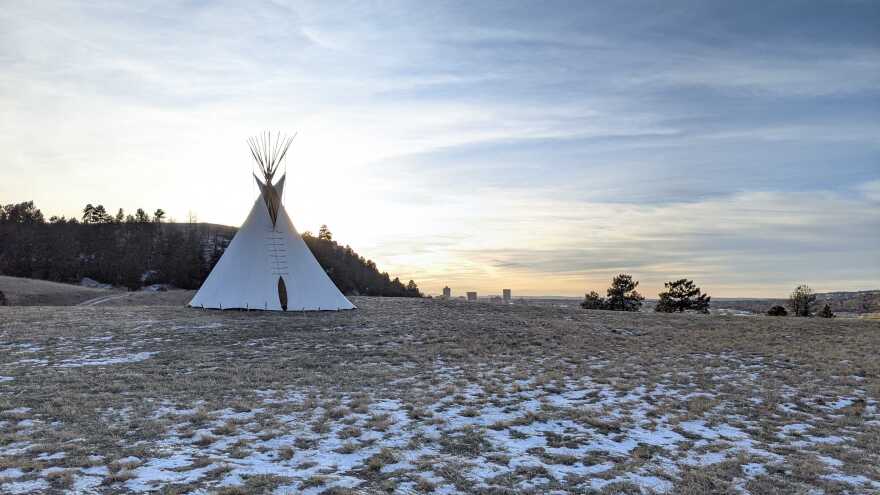The evening before President-elect Joe Biden’s inauguration, a collective of Indigenous organizations erected a teepee near Sacrifice Cliffs in Billings.
As the sun set Tuesday evening, Bill Snell, executive director of the Rocky Mountain Tribal Leaders Council and president of the Pretty Shield Foundation, explained the teepee serves as a memorial for those who’ve died from COVID-19 and as a symbol of hope as the United States transitions to a new chapter under the Biden administration.
"I think it's really important that we as Indian people take the lead a lot of times in this and be able to demonstrate our way of trying to give some hope to the world. This whole effort is a gift to the people from us as Indian people," Snell said.
The white teepee sits on a rolling hill below sandstone cliffs overlooking downtown Billings. Cold wind blew through the green and grey sage brush. Snell says the location was chosen as a reminder of the lengths Crow warriors went to to save others during an earlier pandemic.
"Beyond this ridge is Sacrifice Cliff and Sacrifice Cliff is where 15 warriors blindfolded themselves [and] blindfolded their horses because they don't believe in suicide, but they sacrificed themselves knowing that they could spread the disease that was occurring in the early eighteen hundreds, which was smallpox," Snell said.
The teepee was lit with amber lights, to symbolize the dawn of the new day Indigenous nations and the United States are moving toward. Amber also was chosen because the Washington Monument and other sites were illuminated at the same time across the country as part of a national COVID-19 memorial.
Snell said he hopes this display, like the installment of teepees erected in Billings last month to symbolize tribal members who’ve died from COVID-19, will stir the Biden administration to put even more resources toward fighting the pandemic, which has disproportionately impacted Native Americans.
Tashi Mathuin, who is Northern Cheyenne, said the teepee is a symbol of commonality.
"The lighting of this teepee really signifies a call for unity for our country. We've seen so much violence and we've lost so many of our fellow Americans to COVID over the past year or so and this is kind of like a sacred symbol to show us that we can come together. It's time for us to move forward together," Mathuin said.
Rain Bear Stands Last, the executive director of the Global Indigenous Council, agreed this symbol was necessary.
"To recognize our commonality is absolutely crucial at this moment in time. January the sixth, we all saw what happened in the United States Capitol. I, in my lifetime, did not anticipate seeing symbols of hate carried into the United States Capitol," Bear Stands Last said.
Bear Stands Last, whose family is Northern Cheyenne, Cheyenne Arapaho and Romani, said it was absolutely shocking for people of color to witness Nazi-inspired flags and Confederate flags carried into the Capitol. He said in the midst of COVID-19, now is the time for healing and unity.
"There’s approximately 4,000 people, US citizens, dying from COVID-19 today. So we should really stop and pause and think, you know these are not statistics. We're talking about human beings. And we need to really consider what is happening and pause. And this is a moment for such a pause and such consideration."
Kaitlyn Nicholas is Yellowstone Public Radio's Report for America tribal affairs reporter.



